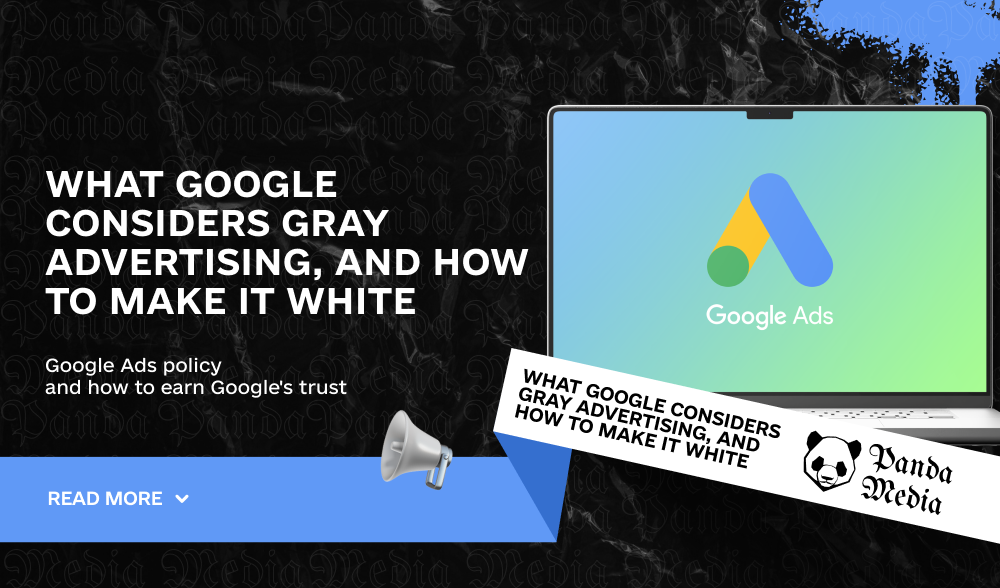
Webmasters who run advertising campaigns through Google Ads often face strict quality control of these ads. Most of the time, ads are checked automatically, using systems based on artificial intelligence, not by humans. Google is overly cautious, suspecting even the most reliable advertisers of possible violations.
In this article, we analyze in detail what types of advertising Google classifies as a “grey area” that can lead to restrictions or complete account blocking, and talk about white methods of traffic acquisition.
Google is known for its strict control over account credibility, payment methods, and other elements. The platform also actively filters account data for links to controversial market niches and affiliate marketing. Although Google officially considers the use of affiliates to promote specific offers or services as disloyal competition, the description of these conditions in the platform’s rules is brief and restrained. Failure to comply with these terms can result in sanctions for even the most reliable and transparent businesses. Several articles of the Google Ads regulations prohibit the promotion of pages that do not provide complete information about a product, service, or company. As a result, any advertisement that represents something that is not directly owned by the advertiser is perceived by Google as a possible violation, which can lead to a permanent account ban.

The only exceptions are advertising agencies that have the status of an official Google partner. Their advertising accounts enjoy increased trust and receive additional bonuses from the platform.
In addition, Google Ads guidelines emphasize the need to provide complete information about the company to attract new and retain current potential customers. However, if the company name does not exactly match the website domain name or the name registered during the advertiser verification process, this may result in the denial of approval of advertising activities through the moderation system. Another aspect that complicates the work of web developers and media buyers who direct traffic to affiliate offers and services is the desire to avoid Google’s mechanisms used to verify ads, landing pages, and other materials.

The use of pre-prepared pharma accounts, high-quality proxies, and a secure anti-detection browser with an effective cloak does not guarantee that blocking will be avoided. Even if you use high-quality pre-roll in your advertising campaign, there is still a risk of account blocking or refusal to place ads.
To successfully work with Google Ads, not only media buyers and webmasters but also direct advertisers should prioritize the constant creation of new domains and advertising profiles, investing resources in strengthening their reliability. To build a reputation for clean campaigns, which in turn improves the return on investment of advertising campaigns, it is necessary, paradoxically, to use the data of other organizations to connect with advertising accounts.

By 2023, affiliates and direct advertisers whose products and services are classified by Google as prohibited or subject to restrictions will have developed alternative strategies to maintain the effectiveness of their work with the advertising system. These include using advertising accounts of Google’s partner agencies that are highly trusted; and establishing a continuous process of developing and maintaining accounts with the purchase of payment methods, proxies, and other necessary materials.
The first method allows you to integrate advertiser accounts into agency advertising accounts, which helps to transfer trust to the main working account without the need for additional activation. Also, campaigns launched through the agency account are processed with priority during moderation. An additional advantage of agency accounts is the ability to return unused funds even if the main account has been blocked.
The second method: the use of Google Ads is also effective, but involves higher time and financial costs. Moreover, the probability of returning unused funds of the advertising budget from some accounts is minimal, and the cost of maintaining accounts increases due to the frequency of blocking.
Google strives for a high level of transparency in its operations, which sometimes
leads to unexpected difficulties, expecting similar transparency from all its advertising partners. This requirement creates obstacles not only for affiliate marketers but also for advertisers who work along with the rules. With the constant tightening and updating of the rules, buying traffic in segments that Google considers controversial using conventional methods through pharma accounts is becoming more difficult. Nevertheless, agency advertising accounts with a high level of trust remain an effective solution to date.
Subscribe and get the latest news, material announcements, and unique offers first.